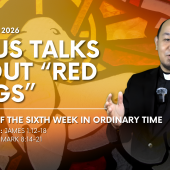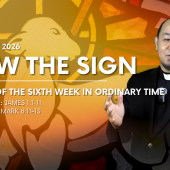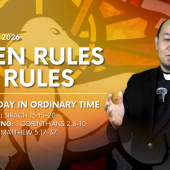Go and talk to him in private

September 10, 23rd Sunday in Ordinary Time
Daily Readings: First reading: Ez 33:7–9; second reading: Rome 13:8–10; Gospel: Matthew 18:15–20
The word of God this Sunday, from the first reading up to the gospel, is making it clear that each one of us is going to be accountable for the situation of our brother and sister.
In the first reading, God is warning against the culture of passivity, letting go, or simply staring when bad habits or behaviors are being developed in our neighbors. It is also a strong way of rebuking the culture of indifference that is so rampant in society. Your situation is yours, and I have nothing to do with it. A corrupted or lazy co-worker, a corrupting classmate, someone who is facing a case of plagiarism, or a drug or alcohol-addicted friend—God says in the first reading that unless we play our role, we are part of their wretchedness.
St. Paul will add in the second reading that it is to such an extent that the sincerity of our love and care for one another will be authentic. One is to love, and another is to tell, out of that love, whatever is not correct in the life of my loved one. Because, as he wrote, "Love does no evil, whereas by not telling or addressing the wrongdoings of a brother or sister, we do evil to him; therefore, we do not love him or her sincerely.
I grew up in a Catholic youth organization called "The Youth of the Light," in which one of the mottos about fraternal correction is: "If you do love me, then tell me the truth straight on my face. And I can attest to the efficacy of correcting and resolving conflicts through this practice. Put aside the fact that those youth are well trained and prepared for the emotional and psychological aspects of telling and receiving the truth.
In most cases, addressing a problem directly has resulted in the emergence of new conflicts in the normal course of society. This is mostly because the receiver takes it personally and holds a grudge. As a result of that, the worst comes in instead. Hence, this practice of fraternal correction is less and less considered a means to solve an issue, as people are afraid of the outcomes.
In this era of the virtual world, people prefer to solve their problems in the social media arena, with all the consequences that go along with those public places. We avoid meetings, sit together, and dialogue frankly and privately, but we opt for public areas while going strongly emotional. That is the reason why the fraternal correction fails.
If the Youth of the Light have succeeded up to now, it is because they have internalized the teaching of Jesus: "Go and tell him his fault between you and him alone. The instructions of the Lord are direct.
The first is to go to him (take your courage and make a move towards him, which can also mean he or she may come to you); the second is to tell (only the problem, issue, or what happened and in what way it is not good); and the third is that between you and him alone (privacy, mutual respect, consideration, equality, etc. are the essential elements to be included).
Knowing human hearts, the Lord knew that this way could not be maintained indefinitely, which is why he provided another alternative while maintaining the first position for face-to-face and sincere dialogue. This means that it is always worthy to begin with. Try to solve it between the two of you only.
Radio Veritas Asia (RVA), a media platform of the Catholic Church, aims to share Christ. RVA started in 1969 as a continental Catholic radio station to serve Asian countries in their respective local language, thus earning the tag “the Voice of Asian Christianity.” Responding to the emerging context, RVA embraced media platforms to connect with the global Asian audience via its 21 language websites and various social media platforms.














